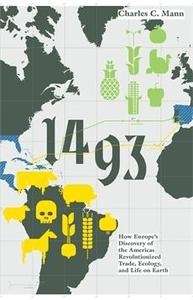1493
. How Europe's Discovery of the Americas Revolutionized Trade, Ecology and Life on Earth

Editorial Granta Books
Fecha de edición septiembre 2011
Idioma inglés
EAN 9781847084040
560 páginas
Libro
encuadernado en tapa blanda
Resumen del libro
Two hundred million years ago the earth consisted of a single vast continent, Pangea, surrounded by a great planetary sea. Continental drift tore apart Pangaea, and for millennia the hemispheres were separate, evolving almost entirely different suites of plants and animals. Columbus's arrival in the Americas brought together these long-separate worlds. Many historians believe that this collision of ecosystems and cultures-the Columbian Exchange-was the most consequential event in human history since the Neolithic Revolution. And it was the most consequential event in biological history since the extinction of the dinosaurs. Beginning with the world of microbes and moving up the species ladder to mankind, Mann rivetingly describes the profound effect this exchanging of species had on the culture of both continents
Biografía del autor
Periodista y autor estadounidense, especializado en temas científicos. Su libro x{0026} x02018;1491x{0026} x02019; ganó el Premio de Comunicación de las Academia Nacional al mejor libro del año. Es coautor de cuatro libros, además de editor colaborador de Science, The Atlantic Monthly y Wired. Ha escrito también, en el área de ciencia, tecnología y comercio, para Boston Globe, Fortune, The New York Times, Smithsonian, Technology Review, Vanity Fair y The Washington Post, entre otros medios, así como para la red de televisión HBO y la serie La ley y el orden.







